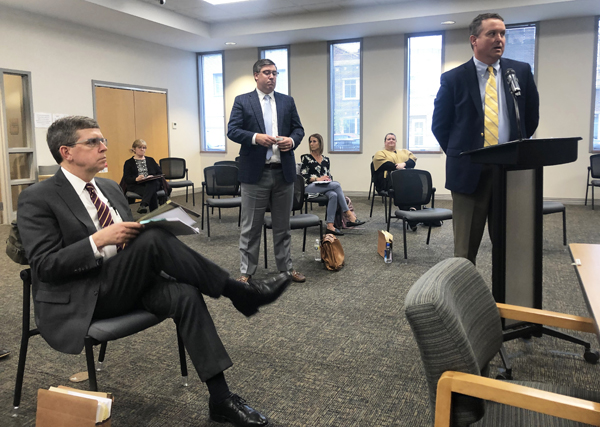
Work started Monday on the Marketplace of Warsaw, and the Common Council approved a resolution and an ordinance Monday night to help the shopping center revitalization move forward.
The resolution approves a development agreement between the city of Warsaw, the Warsaw Redevelopment Commission and Sullivan Wickley, the developers of the Marketplace. The Redevelopment Commission on April 11 approved entering into the agreement.
The ordinance authorizes the city to issue economic development revenue bonds in connection to the Marketplace.
“The developer is asking the city to allow the tax increment, created by their investment into the improvements of the shopping center, to be used to finance the project,” Mayor Joe Thallemer said. “The city also is being asked to back the TIF bond payments for years five to 10 of the 20-year bond.”
He reminded the Council that, “TIF increment that is created is not any existing tax dollars. It’s just new tax dollars created by their investment into the project.”
John Murphy, chief financial officer with Sullivan Wickley, explained that the company is a real estate firm based in Atlanta, Ga., that specializes only in retail. They acquire and develop shopping centers and lease about 3 million square feet of space, and they manage their assets.
“Everything we do is retail shopping centers,” he said, in the southeast and midwest.
The Marketplace was built in 1986 and is 190,000 square feet. It previously was owned by a group out of New York City. In the last few years, Sears, JC Penney, Carsons and Pier 1 all filed for bankruptcy and closed locations, including Warsaw, and the New York group couldn’t service the debt and get the company back, Murphy explained. After a couple years, Sullivan Wickley bought the shopping center Oct. 20, 2021, “because we realized the city of Warsaw has a phenomenal, stable employment base,” he said.
The property itself has “really great bones” and great visibility from the highway, Murphy continued. It is 14% occupied with a few tenants hanging on who like being there. He talked about how he and Sullivan Wickley Executive Vice President of Real Estate Reid Mason were standing in the former Pier 1 space and the roof was leaking because it snowed, and that many of the HVAC systems in the building need replaced or hadn’t been turned on in years.
“So what we’d like to do, what we will do, is to take the property in its current form today and very soon transform it into something similar to what this picture is,” Murphy said as a rendering of the shopping center’s future was displayed on the screen.
Murphy said the permit to start construction on the building was pulled last week. A construction loan with Pinnacle Bank in Nashville, Tenn., was signed last week “and we started demo today. So things will happen, but we will need the TIF for … mostly because of the construction costs.”
Mason said they started marketing the property in October. Planet Fitness will open July 22 and Big Lots will open in October. He said they have a lease with a national retailer for 50,000 square feet where Carson’s was previously located and they will open this fall, but Mason stated they can’t say who the retailer is yet. He said it’s a retailer who residents will like, want and it will fill a void in the community.
Murphy then talked about construction costs and how they’ve gone up because of inflation, issues with the supply chain, labor costs, etc. He said steel prices having dramatically increased and the war in Ukraine with Russia will make those worse because those two countries supply about 50% of the iron ore for Europe so Europeans will look elsewhere to get it.
“It’s very, very, very important that the TIF be approved because it helps absorb the construction costs increases that we’ve experienced over the past 18 months,” he said.
Murphy then stated he wanted to make it clear that “approving this does not impact the general fund of the city, it doesn’t impact individual property taxes for the citizens of Warsaw. Your personal home taxes will not go up.” Only the incremental property taxes generated within the Marketplace Allocation Area will service the bonds, he said.
The benefits to the city will be the creation of new jobs, the attraction of new tenants to the market who aren’t already here and “the TIF helps the project overcome construction cost increases. And we will improve the welfare of the city because we will remove the blight.”
Councilman Jeff Grose said, “The reality is, it’s probably very, very unlikely that activity would happen in this area unless you have this private, huge investment, private investment with public support.”
Councilman Mike Klondaris said this was another example of a public and private partnership that the Council has a history of supporting that benefits everyone.
Diane Quance, Councilwoman, asked if any new construction was planned in the area. Murphy said while they’re address the interior, parking lot, lighting, roofing and HVAC, they will not be building any new square footage.
Randy Rompola, attorney with Barnes & Thornburg, explained how the resolution was to approve the development agreement between the city, Redevelopment Commission and the developer. In the agreement, the city would be agreeing to issue approximately $1,711,000 in economic development revenue bonds. Of that amount, about $1.4 million would be provided to Sullivan Wickley. The balance of that would be used to pay capitalized interest. The bonds are expected to be purchased by Lake City Bank for an expected interest rate of 5.55%.
“The bonds are not an obligation of the city. They are payable solely from the TIF revenues … The primary TIF revenue is the Marketplace Allocation Area and … that was separately established by the Redevelopment Commission over the last few months, and that came before the Council as well a few months ago to approve of the separate designation,” Rompola explained. The Marketplace Allocation Area was carved out of the Winona Interurban TIF District. “Any incremental increases in assessed value would be captured as increment. That is the primary expected source of payment … that is how the bonds have been structured based on those expected amounts of increment that would be generated by the project.”
Andrew O. Mouser, director with Baker Tilly municipal advisors, said, “These are taxable economic development revenue bonds,” making them unique. The bond is up to a 25-year term, but the intent is that the bonds will be paid off in 20 years.
Warsaw Economic and Development Director Jeremy Skinner talked about how Sullivan Wickley knew the risks coming in and the city knew it was going to support it, but the project will bring the property back to life. He also talked about how Lake City Bank has always been supportive of the project and has been a great partner to work with. Murphy later added that Lake City Bank has been stellar to work with and they’re really stepping up.
In talking about the process, Rompola mentioned that the Warsaw Economic Development Commission will meet at 1 p.m. today to have a public hearing and meeting on the bonds and to adopt a resolution recommending that on May 2 the Council adopt the bond ordinance.
On Monday, the Council approved the resolution unanimously for the development agreement and the ordinance on first reading authorizing the issuance of revenue bonds.
In other business:
• Thallemer proclaimed April as Child Abuse Prevention and Awareness Month in support of Court Appointed Special Advocates. This Thursday at noon at the county courthouse, CASA will plant blue pinwheels – the national symbol for child abuse prevention. CASA was started in Kosciusko County in 1992. For more information, visit CASAchildren.com.
• The Council approved a resolution amending the city’s American Rescue Plan Act funding plan to add that the “Treasury Department issued its final rule effective April 1, 2022, which offers a standard allowance for revenue loss of up to $10 million and not to exceed the award amount.”
• The Council approved an ordinance on first reading for an additional appropriation and transfer of $250,000 from Economic Development Income Tax fund to Economic Development Revolving Loan Fund. Thallemer said the additional appropriation was approved in 2021 but didn’t get transferred to “where they were going” so the Council had to redo the additional appropriation. The additional appropriation expired at the end of 2021. The second reading and public hearing will be held at the Council’s next meeting.
• The Council approved an ordinance approving the Belle Augusta section 5 planned unit development. The new PUD will be to the north of the existing Belle Augusta subdivision along CR 225E. The Plan Commission approved the PUD April 11. The second reading of the ordinance will be done by the Plan Commission.
• The Council approved a resolution for a fiscal plan and an ordinance on first reading for the annexation of 1813 Hepler Drive into the city. The property is owned by the Bowen Center who wants it on city utilities. There were no remonstrators during the public hearing for the annexation.
• The Council approved the conflict of interest statement for MS4 Coordinator Ryan Workman.




